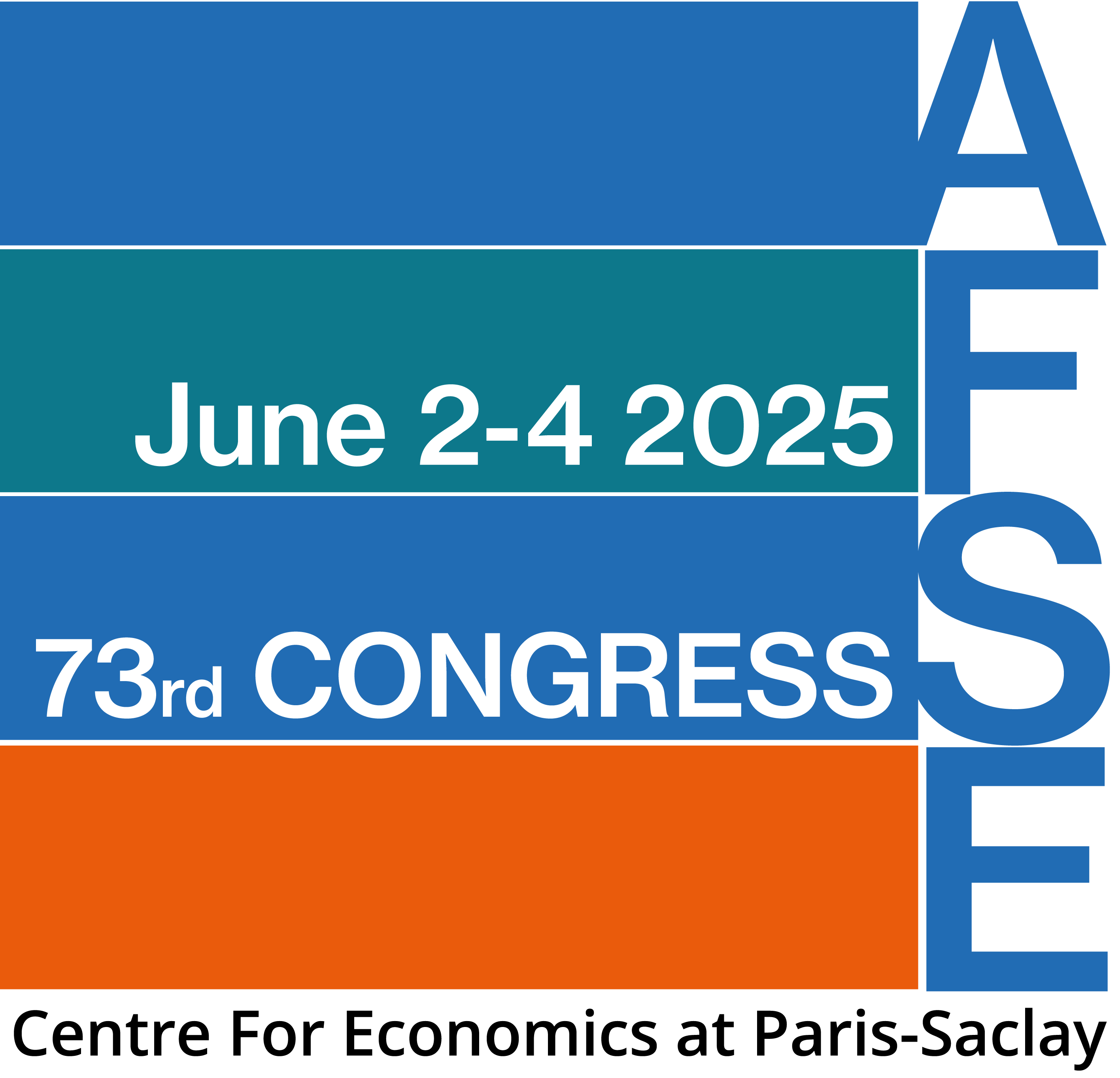

AFSE Annual Congress
Paris-Saclay, June 2-4
73rd Congress of the French Economic Association
|
|
|
Partner AssociationsAssociation Charles Gide: http://www.charlesgide.fr/ Presentation: Since its foundation in 1983, The Charles Gide Association aims at promoting research and activities in the history of economic thought, epistemology, and economic philosophy. The Charles Gide Association welcomes original proposals of sessions or papers. Contacts: Alexandre Chirat (chirat.alexandre(at)gmail.com) __________________________ Association de Science Régionale De Langue Française (ASRDLF): https://www.asrdlf.org/ Presentation: Regional development reimagined: territories as drivers of global transitions Territorial dynamics today are being profoundly transformed by multiple transitions—ecological, economic, social, and industrial—that are redefining the roles and responsibilities of territories in a changing world. This special session highlights innovative work that explores how territories are responding to these complex challenges, integrating the dimensions of sustainability, resilience, and equity.
Contacts: Sébastien Bourdin (sbourdin(at)em-normandie.fr) __________________________ Association Francophone de Recherche en Economie Numérique (AFREN): http://afren.fr Presentation: The French Association of Research in Digital Economics will organize two partner sessions at the AFSE Congress. These sessions will welcome theoretical, empirical or experimental papers on digital economics, in particular on the following topics: Economics of digital platforms and markets, Regulation and Competition Policy at the Digital Era, Algorithms, artificial intelligence, Blockchain, software economics, Personal Data and Privacy, Impact of Digitalization on Labor and firm’s organizations, Digital divide, … Only full submissions will be considered. Contacts: Marc Bourreau (marc.bourreau(at)telecom-paris.fr) __________________________ French Association of Environmental and Resource for Economists (FAERE): http://faere.fr/en/ Presentation: The FAERE brings together researchers, teachers, academics and all those engaged in research and / or expertise in environmental economics and natural resources, to collect the information useful for researchers in the field, to promote all kind of works in the field, to take steps and actions to make those works known by public and private institutions and to build strong relations with the different related scientific associations. The sessions organized by FAERE do not have a specific theme. Contacts: __________________________ Association Française d’Economie Expérimentale (ASFEE): http://www.asfee.fr/ Presentation: ASFEE aims to promote the use of experimentation as a method of investigation in economics. The sessions organized by ASFEE do not have a specific theme. Contacts: Paolo Crosetto (paolo.crosetto(at)gmail.com)
__________________________ Association Française d’Economie du Droit (AFED): https://afed.u-paris2.fr/ Presentation: L'objectif de l’association Française d’Economie du Droit (AFED) est de promouvoir les travaux, en droit et en économie, qui se situent au croisement des deux disciplines. A cette fin, l’AFED organise depuis plusieurs années des sessions dédiées lors des congrès annuels de l’AFSE, pour promouvoir des travaux d’économistes, mobilisant leurs outils, pour aborder des thèmes variés en lien avec le droit comme par exemple : Droit et Numérique - Délinquance et Prévention – Droit et Gouvernance d'Entreprise – Droit Environnemental – Propriété Intellectuelle et Innovation – Droit et finance – Droit et politiques publiques – Production du droit – Résolution des litiges – Droit, responsabilité, innovation – Justice Prédictive – Accès au droit - Droit Asile – Droit et Economie Comportementale – Droit et Politique de la Concurrence – Théorie des Contrats et Régulation – Histoire et évolution de l’économie du droit… Toutes les propositions, théoriques ou empiriques, portant sur des sujets à l’interface du droit et de l’économie seront examinées avec une attention particulière portée sur les sujets originaux, contribuant au renouvellement thématique ou méthodologique de la discipline. Contacts: Sophie Bienenstock (sophie.bienenstock(at)gmail.com) __________________________ French Health Economics Association (CES): http://www.ces-asso.org Presentation: The Collège des Économistes de la Santé (CES) is a learned society with a network of over 300 members and aims to support and animate research in health economics. The sessions organized by CES do not have a specific theme. Contacts: Florence Jusot (florence.jusot(at)dauphine.psl.eu)
__________________________ GDRE Monnaie, Banque, Finance: http://gdre.leo-univ-orleans.fr Presentation: The European Research Group in Money Banking and Finance (GDRE Monnaie Banque Finance) welcomes papers in the field of money, banking and finance. Submissions correspond to papers usually submitted to the GDRE annual conference: Monetary and Fiscal Policy, Financial cycles, Financial inclusion and Growth, Money and (Crypto-) Currencies, Exchange Rates and Capital Flows, Financial Crisis, Banking: Prudential and Competition issues, Corporate and (Behavioural) Market Finance (ESG and green finance), Monetary and Financial History. Contacts: Jean-Bernard Chatelain (jean-bernard.chatelain(at)univ-paris1.fr) __________________________ Association Française de Cliométrie (AFC): http://www.cliometrie.org Presentation: The Association Française de Cliométrie (AFC) will sponsor "Clio-sessions" at the 73th Annual Meeting of the French Economic Association (Association Française de Science Economique, AFSE) organized at ENS Paris-Saclay (CEPS, Centre for Economics at Paris-Saclay), June 2-4, 2025. For the submissions to the "Clio-sessions", please provide also a copy of your manuscript to: webmaster(at)cliometrie.org. Contacts: Claude Diebolt (cdiebolt(at)unistra.fr) __________________________ Association Française d'Histoire Economique (AFHE): https://afhe.hypotheses.org/presentation-afhe-devhist Presentation: The AFHE will organise a panel on “Industrialisation, Economic Development, and Demographic Change” and welcome all papers dealing with the relationship between industrialisation, economic development, and demography in a historical perspective.Since the middle of the 18th century, alongside the development of the Industrial Revolution, major changes in individual behaviour have modified the demographic structure: an increase in the age at marriage, a decline in the fertility rate, a fall in infant mortality and an intensification of migration. These new phenomena, observed at different scales, have transformed local or regional demographic balances and created growing inequalities between geographic areas. In some cases, exogenous factors such as wars, trade treaties and financial or industrial crises, exacerbated or reversed these divergences. More recently, structural changes in Western economies resulted in the deindustrialisation of certain areas, for which the demographic and/or political consequences still require further research.The proposals will focus on the aforementioned themes by using new methodology and/or data, or study classical questions such as: - How did industrialisation (or the lack of) articulate with the demographic transition? - What are the demographic consequences of the de-industrialisation (fertility, mortality, changes in the age structure)? - Economic shocks, demographic changes, and political transformations. Contacts: Pierre Sicsic (pierre.sicsic(at)orange.fr) __________________________ French Association in Spatial Econometrics and Statistics (FASES): https://fases.net/index.php/welcome/ Presentation: The aim of this association is to promote and develop scientific exchanges between economists, econometricians, statisticians and mathematicians on spatial econometrics and statistics and their applications in various fields of research. The growing availability of data over connectivity between observations in the last few decades made it necessary and possible to consider spillovers in economic studies. Contacts: Catherine Baumont (catherine.baumont(at)u-bourgogne.fr) __________________________ Association des Économistes de l’Énergie (AEE) : https://www.faee.fr/ Presentation: The F-AEE brings together energy economists, whether they belong to producing or processing companies, the various consumer sectors, the Administration, the educational sector, research institutes, consulting firms, etc. It deals with the economics of energy, its role in economic and political life and in particular the decision-making processes of management and strategic choices. It addresses these subjects from their different financial, commercial and technical aspects. F-AEE currently has about 350 members and a network of 1800 participants from academia and industry. The main universities and research centres (CGEMP, ADIS-GRJM, EDDEN, CAE, CREDEN...) are represented, as well as the major companies in the sector: Ademe, EDF, Enedis, ENGIE, IFP, Total. Well-known consulting firms are also part of F-AEE's legal entities: McKinsey Company, Microeconomix, E-Cube. The Association of Energy Economists, created in 1986, is the French section of the International Association for Energy Economics. Contacts: __________________________ Association Française d’Economie du Développement (AFEDEV) : https://afedev.fr/ Presentation: The AFEDEV is an association born in 2021 out of the desire to unite researchers in development economics around a collective project. Contacts: Marie Boltz (m.boltz(at)unistra.fr) __________________________ International Network for Economics Research (INFER) : https://infer-research.eu Presentation: INFER a non-profit international scientific organization that stimulates research and research networking in all fields of economics through international workshops and conferences. It has been established in Germany and has members from all continents. Researchers and practitioners are welcomed as INFER members. Universities or research centers can join INFER as institutional members. INFER also aims to become a dissemination partner for large research projects. Contacts: Florina Cristina Badarau (florina-cristina.badarau(at)u-bordeaux.fr)
|


